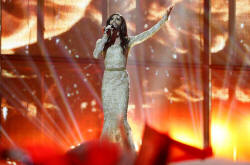|
 Conflict
follows Russia, Ukraine into Eurovision song contest Conflict
follows Russia, Ukraine into Eurovision song contest
 Send a link to a friend
Send a link to a friend
[May 10, 2014]
By Teis Jensen
COPENHAGEN (Reuters) - Singers from
26 nations will compete on Saturday in the kitschy cocktail of pop
and politics that is the Eurovision song contest, with a bearded
Austrian drag queen battling twin sisters from Russia and a
21-year-old crowd darling from Ukraine.
|
|
 Swedish Sanna Nielsen's new-age pop song "Undo" is the
bookmakers' favorite. A win by her would be the second in three
years for Sweden. Overall, Sweden has won the contest five
times, mostly notably with ABBA's Waterloo in 1974. Swedish Sanna Nielsen's new-age pop song "Undo" is the
bookmakers' favorite. A win by her would be the second in three
years for Sweden. Overall, Sweden has won the contest five
times, mostly notably with ABBA's Waterloo in 1974.
But the geopolitical echoes of Russia's conflict with Crimea may
dominate the song contest, which launched the careers of ABBA
and Celine Dion. Many in the Copenhagen audience booed on
Tuesday when Russia's, the 17-year-old Tolmachevy twin sisters,
qualified for the final.
Adding to controversy, the contest's organizers said votes from
Crimea - annexed by Russia - would count as Ukrainian votes,
because tallies are based on existing national telephone codes.
It has been widely speculated that Russia's entry could suffer
for its annexation of Crimea and intransigence on gay rights.
The event is hugely popular in the gay community.
The Tolmachevy sisters, Anastasia and Maria, who won the Junior
Eurovision in 2006, have not commented on the politics.

Ukrainian singer Mariya Yaremchuk, who got huge cheers when she
was also voted through on Tuesday, said her preparation for the
contest has been affected by the crisis in her country.
"Actually, when I was preparing in Ukraine I even couldn’t focus
on working because we all were influenced by that," she told
Reuters television.
In a Nordic region that prides itself on social liberties, the
Danish organizers have declared tolerance a main theme for the
event and the rainbow-colored flag symbolizing gay pride has
been waved many places in Copenhagen.
[to top of second column] |

Austria's contestant, drag queen Conchita Wurst - sporting
high-heels, butterfly eyelashes and a full beard - was voted through
at the second semi-final on Thursday. The audience in Copenhagen
cheered loudly, and the bookmakers see her grandiose ballad "Rise
Like a Phoenix" as a runner-up.
"The beard is a statement to say that you can achieve anything, no
matter who you are or how you look," Wurst told Reuters.
Online petitions were started in Belarus, Armenia and Russia - whose
government passed a law last year banning "gay propaganda" among
minors - to have Wurst removed or edited out of broadcasts in their
countries.
The contest was started in the 1950s to help foster unity after
World War Two, but geopolitics have played a role in the voting
before. Points are now awarded half by professional judges and half
by the public via phone and SMS.
When Russia made a military intrusion in neighboring Georgia in
2009, Georgia wanted to compete with a satire over Russia's
President Vladimir Putin called 'We don't wanna Put In'.
The organisers said Georgia's song was too political and asked the
country to either to change the lyrics or participate with another
song. Georgia withdrew from the contest.
(Additional reporting by Annabella Nielsen; Editing by Alistair
Scrutton, Larry King)
[© 2014 Thomson Reuters. All rights
reserved.] Copyright 2014 Reuters. All rights reserved. This material may not be published,
broadcast, rewritten or redistributed. |